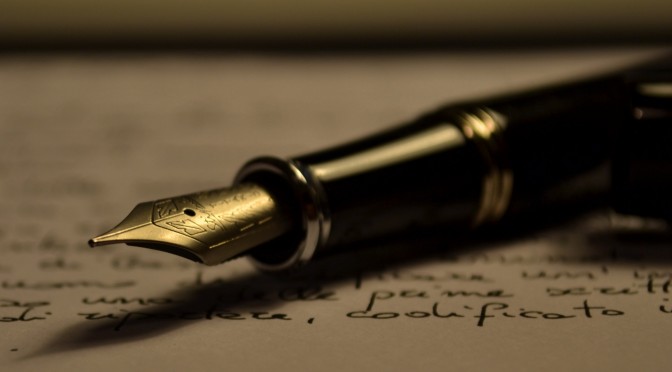I am a dying breed of writer. I use pens, lose pens and throw empty ones away. I tear notebook pages and legal pads, date them, fold them and store them for safe keeping. I write and then I write again. My physical work from the last three years reaches up to my knees.
Unfortunately, long hand writing, writing composed by pen or pencil,- the only writing I have ever known- is going the way of the dinosaurs. Laptops and tablets are in. Pens and pages are out. Technology is winning but we writers are suffering.
Paradigm shifts in art mediums are nothing new. In cinema, film has been losing the battle to video for over a decade. I mostly blame James Cameron. Amazon has a stranglehold on the publishing industry and has squeezed the big six down to the big five. MP3’s are the new CD’s and music labels are hurting so much that vinyl of all things is now the highest selling physical medium.
These shifts are not necessarily bad. Teenagers can use their parent’s cameras to become youtube sensations and anyone with Garageband can call themselves a musician. It is easier than ever to be an “artist,” but for writers, using the newest technology is a slippery slope.
The benefits of writing long hand are numerous and any serious writer would be foolish to ignore them. First and foremost, you actually learn more effectively by writing long hand. The process stimulates a part of the brain called the “Reticular Activity System,” which is basically when your brain says “wake up, pay attention!” Click that link if you are skeptical.
But that is not the only example of science supporting the pen and page. A study by Leopoldina Fortunati and Jane Vincent titled Sociological Insights on the Comparison of Writing/Reading on Paper with Writing/Reading Digitally asked over 150 communication students to reflect on their writing process. The students considered writing on paper to be more immediate.
The study also concluded that long hand writing is more personal and more free in the sense that the writer is in control of the flow of the words. “There is a tactile experience and almost an extension of one’s own hand which can be done only by the pen.” We can shape the letters however we want without scrolling through different fonts and sizes and can also create whole new words without the fear of squiggly red lines. The writer is free to doodle, to touch and feel the paper texture and to apply emotion to every pen stroke.
Writing on the computer was found to be far more constraining with word programs predetermining space for which to write. There is no doodling and the act of typing is far less expressive, stylish and personal. The computer, in a sense, has more control than the writer.
Furthermore, the computer screen is distracting. Most writers start typing and then end up checking emails. Facebook, Twitter and other time sucks are mere clicks away. Plus, our eyes are not made for staring at artificially lighted screens.
I do understand that some writers believe typing to be faster and environmentally conscious. Writing long hand and then transferring to the computer, however, automatically adds a revision step to the writing process. There are also far worse things that humanity is doing to the Earth than using paper.
For those of you that are still on the fence about writing the old fashioned way, consider how you first fell in love with letters. Whether from a great novel or piece you had penned, I’ll reckon it did not involve a computer or tablet. There is nothing romantic about a plastic and titanium case. Art and ideas belong on the physical page.
Discover more from UCWbLing
Subscribe to get the latest posts sent to your email.

